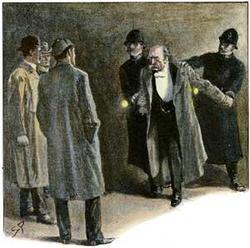Monday, August 1: The Scribbler
SHIKARI, RATTLE, AND ROLL
by James Lincoln Warren
I have been asked by Janet Hutchings, editor of Ellery Queen’s Mystery Magazine, to make a podcast recording of my story “Shikari”, which I wrote specifically for their annual Sherlock Holmes tribute, the next of which will be the February 2012 issue. (I should mention that although Janet assures me that the story will see print, I really shouldn’t count my chicks before making the omelet, since I haven’t seen a contract yet.) The story is very long, and so I decided to record it at home in installments rather than wait until the next time Janet and I are in the same town, which will be in mid-September for Bouchercon in St. Louis, and do it all at once in her hotel room, as Mary Jane Maffini and I did for Mary Jane’s Agatha-winning story, “So Much in Common” in Bethesda earlier this year at Malice Domestic.
“Shikari” comes with its own specific set of difficulties along with the general ones of making a recording at home. Among the latter, you can include ambient noise, which in my neighborhood in West Los Angeles means regular emergency vehicle sirens, loud traffic, and helicopters orbiting overhead, along with the usual doorbells, ringing phones, and the ubiquitous bowling ball-dribbling upstairs neighbor (well, that’s what it sound like). These can be overcome by patience. But to address the former, there is nothing to be done but the application of industry.
“Shikari” features three first-person narrators, the first of whom is the putative “editor” of the piece, viz., yours truly, the other two both being well-educated Victorian Englishmen. Being Victorian and well-educated means that they most likely spoke with Received Pronunciation (“RP”) English accents. I am not English, except ethnically, and RP is not remotely my native accent, so there’s Problem 1. Problem 2 is that they are men of vastly different character, age, and experience, and their actual voices must as distinct from one another as their literary voices are.
Affecting a British accent, I am certain that I could never pass for an old Oxonian in Britain, but for my purposes, I think it’s sufficient simply to get close, to light the lamp of the Gentle Listener’s imagination, as it were. But that still requires some preparation. So I went through the typescript and made notations regarding particular pronunciations here and there. Sometimes this meant pointing out how the vowels should be pronounced in certain words. These can be very different: Americans pronounce “Afghanistan” with all three “a’s” short, as in “I am”, but in RP, it comes out closer to “Efganistahn”, where only the middle “a” is short. But the most difficult part was getting in the use of supernumerary “r’s” between words that end and begin in vowels or vowel sounds. For example: In RP, the word “war” is pronounced (more or less) as “waugh”1, and the “r” at the end is only sounded if the next word begins with a vowel, so “War Office” comes out as “Waugh Roffice”.
So the marks were made. Not perfectly, to be sure, and even if the marks are largely correct, I’m not claiming I can necessarily get my tongue around all of them, so the attentive Gentle Listener will no doubt detect that I am actually a Yank putting it on. So let it be written. But as Sergeant Preston of the Yukon never said to his faithful canine companion, “King, our job here is not quite done.” The problem of the sound of the three voices remained.
Jackie Sherbow, Janet’s Assistant Editor, advised me that the software that Dell Magazines uses to record their podcasts is Audacity, which has the great advantage of being freeware. So I downloaded it and started playing around with it. The first thing I noticed was that the recordings I made were very quiet, and the second thing I noticed was a lot of “white noise” (i.e., a hiss) in the background. No trouble—among the electronic effects available in Audacity is one for amplifying the signal, and another for noise reduction. And then I noticed something else: there’s an effect for changing pitch. This is intended for music, but it works equally well on a plain voice. I had to be careful, though, because it shifts one’s entire voice with all the attendant overtones, and an excessively liberal application makes it come out like a cartoon character—tweaking one’s voice too high turns one into a chipmunk, cast it too low and, ahem, one soundeth as one might speaketh employing the antipodal orifice.
I found that raising my voice up a half-step pitched me tenor, and that lowering my voice three quarter-tones made me sound something like Christopher Lee (which tickled me immensely). Here’s an example, with all four corrections applied:
Cool, huh?
The last problem I recognized was that I was reading much too fast. Most people who have grown up in Texas tend to talk in a slow, stately rhythm, but I rattle away like a tommy gun. Maybe overcompensating a little, now I’ve retarded my delivery so much that I’m worried the pace will be like unto blackstrap molasses in the most frigid of Februarys. But not to worry. Audacity also has a feature for changing tempo. We’ll see.
- With apologies to Mr. Evelyn. [↩]





























